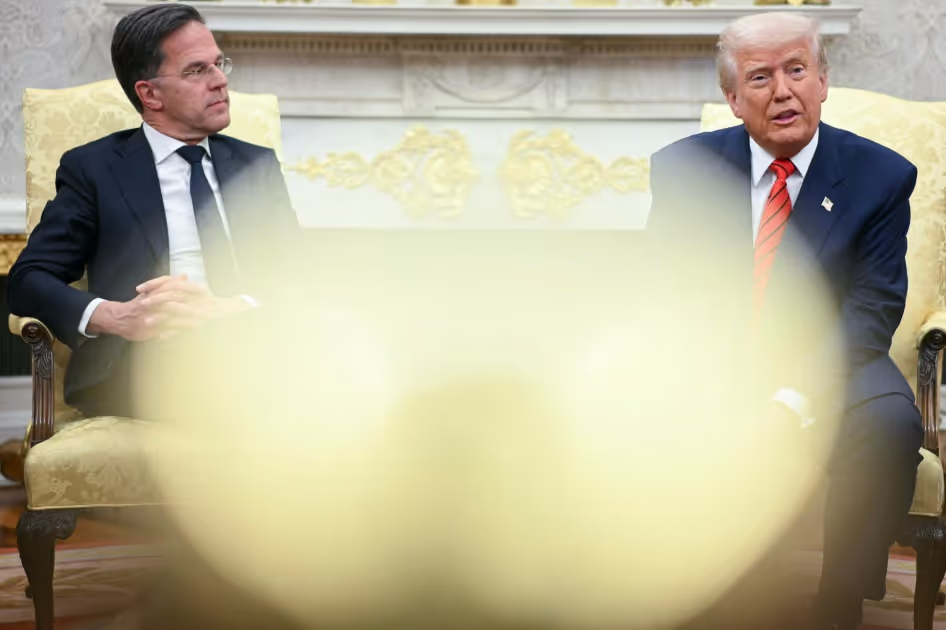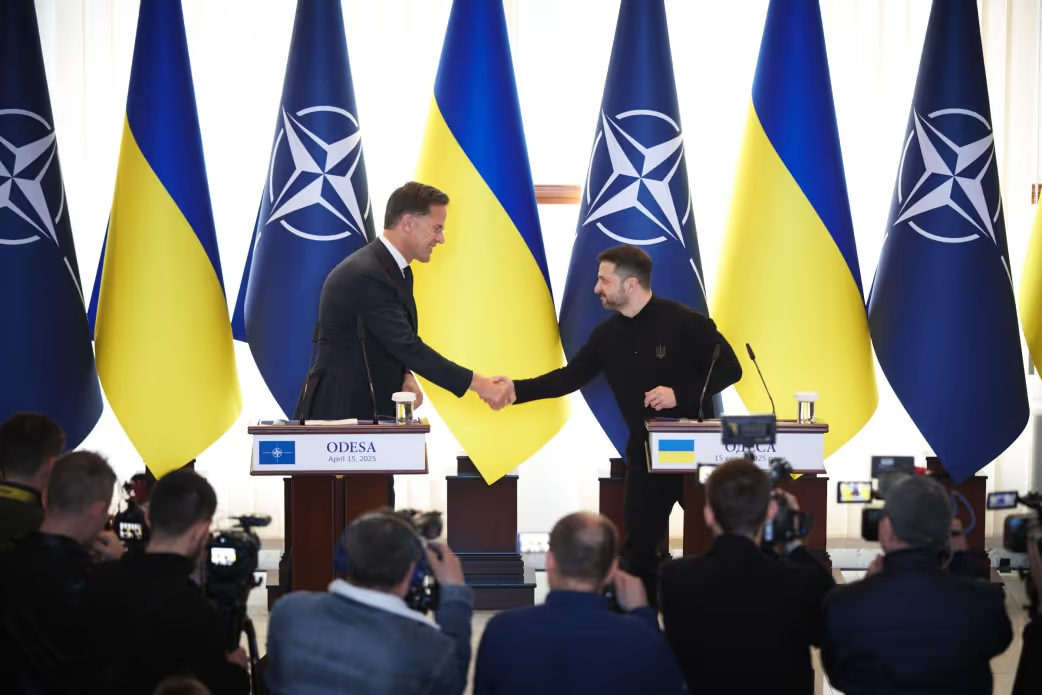Support Sestry
Even a small contribution to real journalism helps strengthen democracy. Join us, and together we will tell the world the inspiring stories of people fighting for freedom!
The Estonian politician has a reputation as a «Russophobe» because she can convincingly explain why Russia should not be trusted on land, in the Baltic Sea or at the negotiating table. It is rare to find someone in Brussels who calls things by their proper names. Kaja Kallas openly states that the war against Ukraine is not a minor regional conflict but rather a piece in a grand game where the ultimate prize is bringing Moscow’s subjects to heel.
The Estonian Prime Minister’s stance is so strong in the Western world that her name was among the finalists for the position of NATO’s new Secretary General

Here, an intriguing detail must be added: the refined blonde with a steely character is the Kremlin’s worst nightmare. She is not merely banned from entering Russia, as is the case with most rational EU politicians, but she is also the first government official whom Moscow has officially placed on a criminal wanted list for «desecration of a historical monument».
The reason - the decommunisation and removal of numerous monuments from the Soviet occupation period, carried out by Kallas’s government. Russia was particularly adamant about preserving a Soviet tank in the border town of Narva, where ethnic Russians significantly outnumber locals.
Previous Estonian governments had raised the issue of relocating the tank, which symbolised not so much the fight against Nazism as it did Russian militarism. However, fears lingered - the mass riots in Tallinn in 2007 (the so-called «Bronze Night»), carried out by local Russians and agitators from Russia in response to the relocation of a monument to a Soviet soldier in the Estonian capital, heightened concerns that another move could trigger a repeat of those events, from street clashes to cyberattacks on government websites. However, in the summer of 2022, after visiting the de-occupied town of Bucha, Kallas took the issue to a new level. In the end, despite the complaints of Russian speakers, the tank was sent to storage.

In 2023, when the politician was already being named among those who could join the new European top elite, she gave an interview to British hard-talker Stephen Sackur. At the time, the journalist asked whether her heart was open to the 25% of Russian speakers who complained of severe oppression - they were not allowed to enter Estonia with Russian car number plates. Interestingly, the loudest outcries came from the so-called Russian opposition. Kallas’s response was firm:
- You are confusing two things. Russians who live here, we call Russian-speaking Estonians. And Russia is a separate matter. I want to point out that, firstly, in the 1920s, Russians in Estonia made up 3%. By the end of the occupation, it was 30%. So it is not as if they had always lived here...
- Are you saying that they are not real Estonians? - Sackur clarified.
- No, no. I am saying that those who want to be part of Estonia, who consider Estonia their home, have applied for citizenship, learned the language and are part of our society - they constitute the majority of our Russian-speaking population. We ask for only one thing: learn our language, because that is who we are, we live here - and it is a way to integrate them. Furthermore, I want to emphasise that even if we have a different history, we share a common future, and we are focused on that.
It felt like a cold shower, as nothing like this had ever been heard on the BBC.
Kallas takes a very sober view of today's threats due to her poignant family history
In March 2022, she wrote a column for the New York Times explaining why Russia’s occupation of Ukraine and its repressive actions reveal its true face.
«My mother was just a six-month-old baby when, in 1949, the Soviet authorities deported her along with her mother and grandmother to Siberia. My grandfather was sent to a Siberian labour camp. They were lucky to survive and return to Estonia, but many did not. Today, the Kremlin is reviving methods of outright barbarism», - Kallas admitted.

Her father, Siim Kallas, played a central role in Estonia’s independence movement and was the president of the country’s central bank. When the young Kaja decided to try her hand at politics, many advised her against it. Some doubted that a model-like woman could also be intelligent, while others even called her a «daddy’s girl».
However, by 2014, Kallas, as a Member of the European Parliament, had already proven herself an expert in digitalisation and had become an advocate for Ukraine at the outset of the war with Russia. It is important to clarify - this was at a time when global leaders were reluctant to confront Moscow and saw no major issue with the annexation of Crimea. After all, there had been a referendum, people had chosen Russia. What was the problem?
As Europe's chief diplomat, Kallas has a very clear-eyed assessment of the risks facing Europe
Above all, these include various hybrid threats across the EU - sabotage, cyberattacks, the shadow fleet, GPS disruptions and damage to cables. She is pushing for increased funding for security and defence, as simply relying on Washington’s nuclear umbrella in the Trump era is akin to suicide.
Kaja Kallas is convinced that the European Union must launch its own defence industry, as she stated in an interview with Suspilne in December 2024:
- The defence industry is crucial because a war is raging on European soil, in Ukraine, and Putin shows no signs of abandoning his objectives.

As the rational voice of Brussels, she has subtly explained to the United States why supporting Ukraine is in America's best interests:
- If America is concerned about China, then it must first worry about Russia. We see that Russia, Iran, North Korea and China are working together. We also see what Putin is doing in other countries, actively expanding his influence. So, if the US wants to remain the world’s strongest power, it will ultimately have to deal with Russia. The easiest way to handle this is to support Ukraine so it wins the war.
Ukrainian diplomats who maintain close contact with Brussels all unanimously note that a new generation of competent and determined women has entered European politics. They are professional, steadfast in their positions and fully aware of their identity and purpose. The name Kaja Kallas is mentioned most often. She is not just a self-made woman but also a descendant of Estonians whom Russia deported like cattle to Siberia, hoping that no one would survive the lumber camps.
Yet Kallas’s mother survived and instilled in her daughter an understanding of why Russia is an enemy and why its favourite pastime is killing and looting
The Estonian with an unyielding character has become the loudest voice of Eastern Europe in Brussels, representing the very region that Moscow stubbornly considers its sphere of influence. However, as time and experience show, small nations also have a voice and teeth. They can bite the throat of the predator that pushes in uninvited.
The project is co-financed by the Polish-American Freedom Foundation as part of the «Support Ukraine» programme, implemented by the «Education for Democracy» Foundation



Ukrainian journalist, political analyst and media consultant. She has worked as a parliamentary observer for over 10 years and collaborates with publications such as «Censor.net» and «Espresso». She is the creator of popular YouTube channels «Censor.net» and «Showbiziky». Her specialisations include politics, economics and media technologies.
Support Sestry
Even a small contribution to real journalism helps strengthen democracy. Join us, and together we will tell the world the inspiring stories of people fighting for freedom!






















